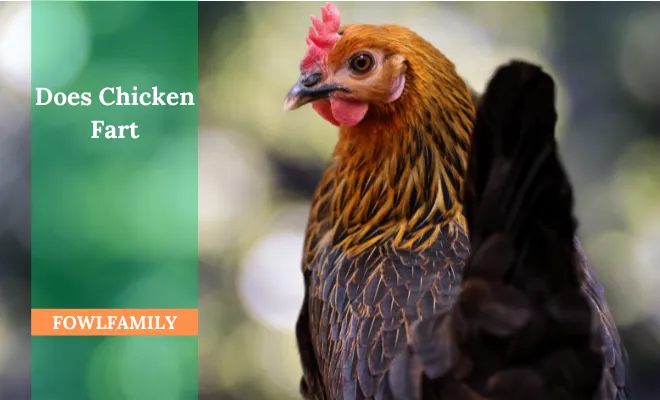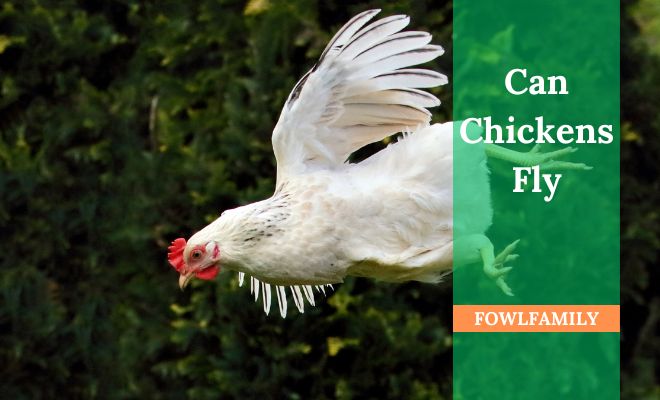Does Chicken Fart? (Yes, Chickens Do Fart!)

Seems awkward, but still, Does chicken fart? Yes! In fact, chickens are one of the few bird species that fart. This is because chickens take a relatively long time to digest their food fully.
This time allows more gas to build up in their intestines. When this gas is eventually released, it comes out as a fart. So the short answer is – yes, chickens fart!
I know it’s one of the weirdest to discuss. But trust me, there is much more interesting information. Keep on reading this article to know all this.
Table of Contents
Why Does Chicken Fart? Is it Safe?

I’ve said earlier that the main reason chickens fart is due to their unique digestive system. Chickens have a gastrointestinal tract that supports food fermentation, which leads to gas production.
Here’s a well-explained video on Chicken and their farting habit:
How does Food Fermentation Lead to Gas Production?
Fermentation breaks down the carbohydrates and fiber that chickens take. This fermentation is essential for chickens to digest and absorb nutrients from their food fully.
However, one byproduct of fermentation is hydrogen, methane, and carbon dioxide gas production.
Since chickens only have one exit for waste at their cloaca, both solid and gas waste (farts) exit through this single orifice.
Chicken farts are entirely natural and harmless. The gas release allows chickens to empty their intestines and make room for more food.
So while chicken farts may be a bit stinky, these are a normal part of their digestive process.
How Does a Chicken’s Digestive System Work? 5 Phase Explained!
To understand chicken farts a bit better, please take a closer look at how a chicken’s digestive system works.
- Phase 1: It starts in the beak, where chickens use their tongues to manipulate food and swallow it whole. Since chickens don’t have teeth, they rely on their gizzard to grind up food.
- Phase 2: The gizzard is a muscular organ filled with small stones that help crush and grind food. Powerful contractions of the gizzard turn the stones, breaking down the food into small pieces.
- Phase 3: Once ground up, the food passes into the small intestine, where most nutrients are absorbed. Finger-like villi line the intestine to maximize absorption.
- Phase 4: Next, the food passes into the ceca. This is where fermentation takes place, breaking down fiber and producing nutrients and gas.
- Phase 5: The gas buildup is eventually released through the cloaca as a fart. Without a way to expel gas, chickens would be very uncomfortable.
What Do Chicken Farts Smell Like?

Most people who have been around chickens would agree – chicken farts stink!
The exact smell depends on their diet, but common descriptions include:
- Rotten eggs
- Sulfur or rotten egg burps
- Foul stench
- Noxious gas
This unpleasant smell comes from hydrogen sulfide, a sulfur-containing gas produced during fermentation. The high protein diet of chickens leads to increased sulfur in their intestine.
So while farts help chickens’ digestion, we humans find the odor rather awful!
What Does a Chicken Fart Sound Like?
Chicken farts make distinctive sounds, though not quite as loud as human farts. Some of the sounds chicken farts produce include:
- Short, popping sounds
- Tiny bursts of air or squeaks
- Bubbly-sounding flatulence
Chickens most often fart while resting or sleeping. The sound tends to be high-pitched and brief. While subtle, chicken owners claim once you’ve heard one, you’ll recognize chicken farts instantly.
Are Chicken Fart Harmful for Environment? Unfortunately Yes!

Well, that’s a huge discussion. In short, the farts aren’t harmful from an individual point of view. But, we have to consider it in the bigger picture.
Chicken farts do release some methane, which is a potent greenhouse gas linked to climate change. However, on a per-chicken basis, the methane released is pretty small.
One estimate found chicken manure accounts for just 0.1 grams of methane per hour from a single chicken. Compared to a cow, which can produce 200-500 liters of methane daily, that’s not very much.
Here’s a breakdown of emissions from chicken farts:
- Methane – 0.1 grams per hour
- Carbon Dioxide – 2.6 grams per hour
- Nitrous Oxide – 0.16 grams per hour
So, Where’s the Problem Mainly?
The bigger concern is commercial poultry farming. In these setups, thousands of chickens are housed together. The methane emissions from chicken manure now have to be considered.
A report by Mississippi University showed an alarming picture. That is, the U.S. poultry industry produces approximately 9% of greenhouse gas emissions from animal agriculture (until 2019). This comes mainly from waste products like manure and associated methane.
A decade ago, research performed by the Department of Poultry Science, University of Georgia, said the ratio was 3%. How the ratio increases is a matter to be concerned about!
How to Utilize Methane Emission?
Composting chicken manure is a great idea! It is especially for backyard raisers who are concerned about the environmental impact. Composting helps utilize the nutrients in manure in a more sustainable way rather than simply letting it emit gases.
Recommended Articles:
FAQs
Here are answers to some common questions about chicken farts.
Q: Do chickens fart a lot?
Chickens don’t fart as often as cows or humans. They fart, on average, around 30 per day.
Q: Do chicken farts make them lighter?
Because chickens can’t pass gas as frequently as needed, chicken farts don’t make them lighter.
Q: Are exploding chickens from farts true?
No, stories of chickens exploding from excessive gas are an urban myth. Farts allow chickens to release gas safely. It’s safe, and don’t make a chicken explode for it.
Bottom Line
So, chicken farts are real. However, they don’t fart quite as often or as loudly as some other animals. The smelly farts are simply a byproduct of their unique digestive system. So chicken farts may offend our noses, but they are perfectly normal and healthy for chickens!
However, large poultry setups would have higher greenhouse emissions. Since it is increasing faster than the previous decade, taking the necessary steps is crucial. Composting the chicken manure is the best idea to utilize it and not cause environmental harm.
Sources and References:
- https://iopscience.iop.org/article/10.1088/1755-1315/1060/1/012082
- https://poultry.caes.uga.edu/content/dam/caes-subsite/poultry/documents/greenhouse-gas-emissions-from-livestock-poultry.pdf






